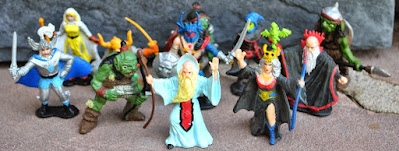Over the years since its creation, the standard mode of D&D has become a subgenre of fantasy unto itself, codified now in the other rpgs that followed on its coattails and the other media they've inspired. GURPS terms it "Dungeon Fantasy," though I don't think it required dungeons--though obviously they play a big part.
The essential element as I see it are:
- The primary characters are a loose group of companions.
- Well-defined character roles/types and capabilities, very often recognized within the fictional world.
- Characters engaged in quests or missions in dangerous locales, mostly commonly underground.
Other elements that are common are:
- A setting with pre-modern technology.
- Adventurers as a recognized role in society.
- A large variety of monsters, categorized and taxonomized.
- Hierarchies of capability within character types.
- The development of character abilities and capabilities over time through dangerous trials. Sometimes there are in-setting codified tiers or levels.
There are, of course, others but these are things I feel like are less common in fantasy works that aren't in the subgenre than those that are. There may even be some work that if you play loose enough with definitions that would fit all of the above that we wouldn't consider "D&D fantasy," but genre boundaries have never been impermeable and precise things.


A lot of these try to drill down into setting conventions but I like this one because most of it revolves around the party and the dynamics of the rotating group protagonist. They can travel across just about any pre-modern landscape but the heart of the genre is that it's a team sport.
ReplyDeleteCan we say anything about the "dungeon master" in dungeon fantasy? Does there need to be a sense that the party is being resisted or opposed in some way? Where does conflict come from?
It's also interesting that you could be describing original Star Trek or Sgt. Rock if not for the technology constraint. Maybe dungeon fantasy is simply a survival of squad narrative distilled through the quest group (LOTR, Shannara, Enchanted Pilgrimage) . . . every seven is magnificent and every dozen is dirty.
Could question regarding the Dungeonmaster, I'm inclined to say not, but it requires some though.
ReplyDeleteST and Sgt. Rock differ not just in technology but that aren't "loose groups" (having well-defined systems of hierarchies), and Sgt. Rock in particular doesn't have as well-defined role/types. Little Sure Shot maybe be a scout, but he's a scout not The Scout. Sgt. Rock characters are more defined by background or personality. Also, neither are adventurers, both are soldiers of a sort.
Love it. So the "party" tends to be a pick-up group and not something planned . . . more magnificent 7 than hand-picked dirty dozen. I guess if they were more hierarchical they'd be a "guild" (lawful neutral or otherwise) and so dungeon fantasy stories emerge when people work across org charts?
ReplyDeleteYeah, just exploring on the dungeon master because the genre seems to do so much work preserving the tabletop character dynamic so I'm wondering what else is carried over.
Ironically this might get back to the role of humor in other dungeon fantasy media. It rarely seems to emerge from the setting (which needs to be deadly serious to make most people happy, mom) and so comes out in quippy intergroup riffing that reinforces party cohesion.
I think so. Hawk the Slayer (though I wouldn't class if as of the subgenre) is the evolutionary missing link between the Magnificent Seven and the adventuring party.
ReplyDeleteRegarding the humor, I think the more a work leans into the stereotypes (and handles their implications realistically) the more humorous a work tends to be. It's not that different than superheroes, in a way. D&D isn't merely about suspending disbelief for magic anymore than "believing a man can fly" is enough to allow you to buy the Superman mythos.
I like these missing links, like a gorilla in a zoot suit. The adventuring party probably also took a lot of "found family" cues from Beastmaster and the Conan movies, then by the time you get to Willow (speaking of humor, see below) it might be too late.
ReplyDeleteLeaning into the stereotypes makes me think about how Terry Pratchett largely conquered the dungeon-fantasy-as-parody world after Asprin and Foglio gave up. But that's a side topic!